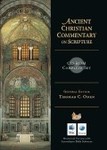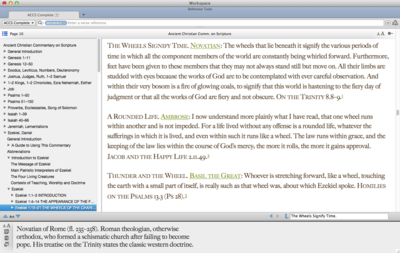
While Calvin may have been able to refute the accusation of patristic ignorance, subsequent generations of Protestants have indeed become increasingly ignorant of the fathers, their teachings, and their interpretations of the Bible. Recent years have seen a variety of efforts among Protestants to correct that. Some have sought to establish meaningful dialogue with Roman Catholicism and Eastern Orthodoxy. See, for example, the recently released Counterpoint book on whether Eastern Orthodoxy and Evangelicalism are compatible.
Another effort to increase awareness of the church fathers can be seen in resources designed to make their writings more accessible. Among these is the Ancient Christian Commentary on Scripture series by InterVarsity Press. This series of commentaries provides interpretative comments from various church fathers for each book of the Old and New Testaments, as well as most of the apocrypha. We’ve offered a partial edition of this commentary for several years now, but we’re pleased to announce that the complete series is now available as a single Accordance module. That’s twenty-eight volumes of commentary spanning the first seven centuries of church history.
Most commentaries are written by a single author who seeks to explain the meaning of one or more Bible books. The ACCS is different. It does not give a systematic exposition by a single commentator, but juxtaposes the insights of a variety of interpreters. Reading it is like attending a group Bible study and listening to the interplay of different perspectives: philosophical, pastoral, applicational, polemical, and sometimes a little obscure. Reading the ACCS typically makes me want to think more deeply about the passage I’m studying, which is especially helpful after I’ve done the work of exegeting a passage myself and then consulting more expositional commentaries. The challenge after all that study is to avoid looking at the passage like a scientist looks at a bug under glass, and the ACCS can help you recapture some of the beauty and mystery of each passage.
The ACCS Complete is available on disk, and can be ordered here. Also see this page for a more detailed description from the publisher.


